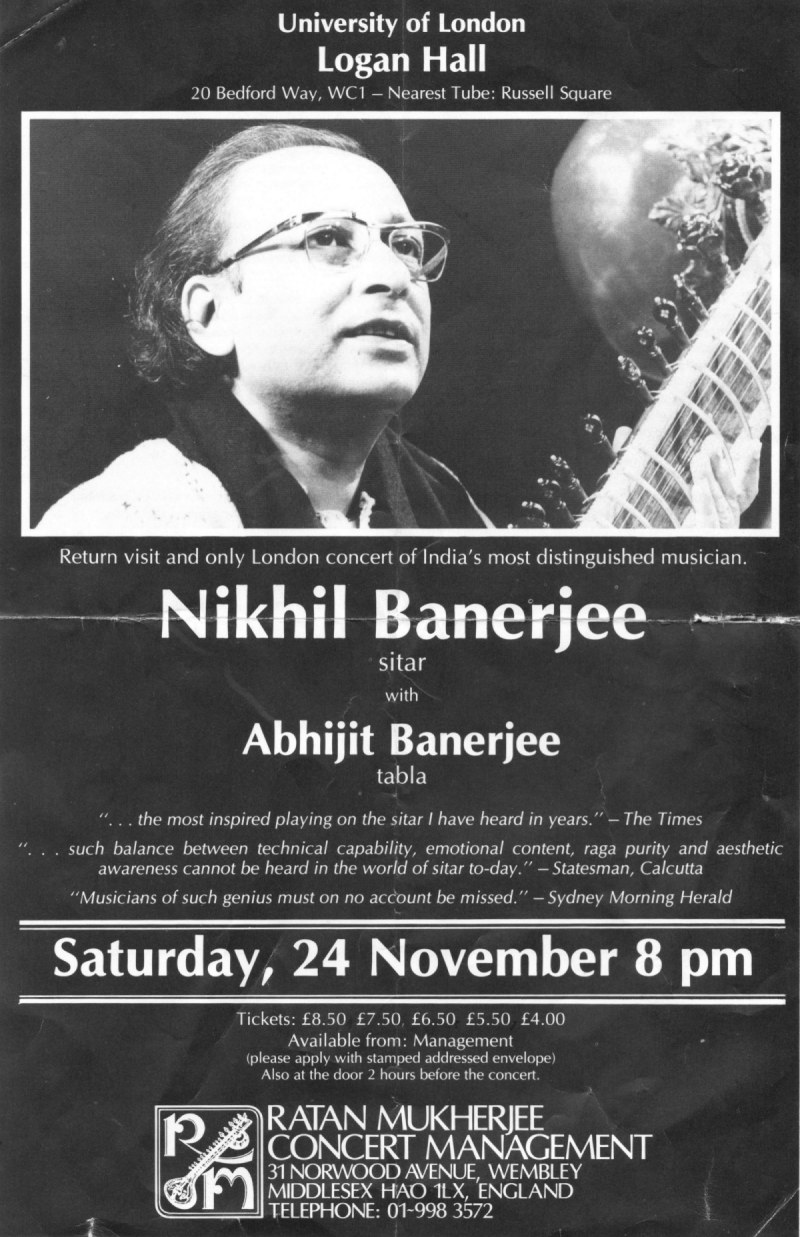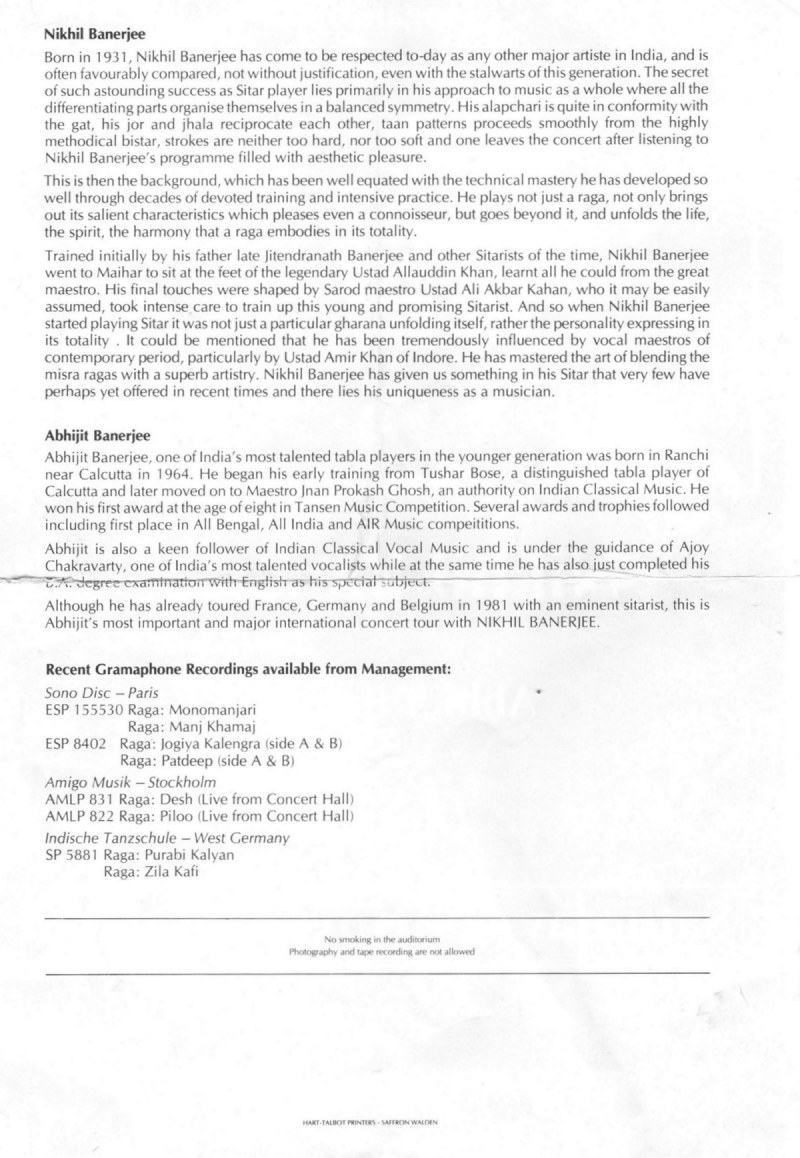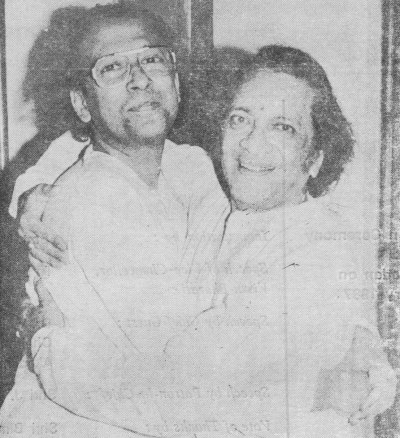|
Appreciation and Biography
I believe I first heard of the passing of Pandit Nikhil Banerjee in early 1986 when the announcement came during the introduction of the regular weekly programme London Sounds Eastern on BBC Radio London, a regular Sunday evening programme of Indian Classical Music. I was shocked. The only artist's death with the same impact on me had been Buddy Holly's, twenty seven years earlier. Just short of being a teenager, while delivering newspapers on a chilly winter morning I had been stopped in my tracks, stunned by the front page news of the plane crash.
Nikhilda was only fifty four, and I had no idea he was ill. I had assumed I would be enjoying his music for many years to come. Even today the memory of Nikhilda's passing can still bring a tear to my eyes. His death came at a cruelly young age for such a gifted person. Our loss was great.
In the three decades since then, I have met many people who have carried his memory with them over the years, and many more younger people who have been newly entranced by his playing. He has become one of the most revered Indian musicians of our age, not just for his masterly playing, but his modest and devotional approach which has even prompted some to call him a musical saint.
So what was so special that it generated such devotion?
As for Nikhilda's technical proficiency, that can be no doubt, he was a total master of his instrument, second to none. Yet he maintained melodic phrasing even in the fastest jhala, which in lesser hands becomes a tedious notefest. Nikhil Banerjee could play such breathtaking beautiful melodic phrases that could make the heart melt, and it is above all this lyricism which to my mind makes him unique as a player. His style is unique and unmistakable. There is only one sitar player today who to my mind occasionally reminds me of Nikhil Banerjee when I hear him, and that is Kushal Das.
Listeners can judge Nikhilda's playing for themselves, as we have a substantial legacy of recordings. We also have a few precious video recordings which show us a glimpse also of Nikhil the man, and his charming and modest stage presence. They also show us a little of his partnership in his last years with Anindo Chatterjee, a wonderful partnership.
I was brought under the spell of Indian Classical Music when I heard it for the first time at Cambridge, a performance by Ustad Vilayat Khan. I was enthralled by the instruments, the clothes, and above all the music. It led to a passion for many things India which has stayed with me. The first LP I bought, shortly after hearing Vilayat Khan, was by Pandit Ravi Shankar. But from the time I first heard Nikhil Banerjee, for me there was no contest, no looking back. Although I still enjoy, in particular Vilayat Khan's music, Nikhilda held my allegiance, and that has not changed in over forty years.
I saw Nikhil Banerjee live only a few times, in London in the early 1980s, and my memory of those has faded. If you ask me what ragas were played, etc, I would not know. I remember in particular, though, one London performance - a double bill with Ali Akbar Khan - when after performing his set Nikhilda was seen coming to sit in the front row to listen to his mentor play. I chiefly remember Nikhilda's performance as being the only time ever in my listening experience I have understood what people mean by saying that Indian Classical Music has the power to take you to a different, transcendental, state.
Much of his music remains, archived in published recordings, and also preserved by audience recordings, which outnumber the published works and add significantly to the archive of his work. This site does what it can to document this legacy.
To answer the question of what made Nikhil banerjee's art so special and unique, we have an analysis by Nilaksha Gupta, a music critic whose article for the Telegraph was printed in the programme for the concert on the first anniversary of Nikhilda's death, when Ali Akbar played with Swapan Chowdhury for the Nilkhil Bandopadhyaya Smriti Sansad. I was fortunate enough to be given a copy of this programme by Nikhilda's wife Roma Banerjee when she kindly allowed me to visit her home in 2010. It offers a far clearer insight than I can offer.
I also take from the same programme a shorter article by Anindya Banerjee giving a more intimate glimpse into Nikhilda's life.
"What happens, you know, before your finger goes to some notes, actually, your heart sings inside."
Nikhil Banerjee
Continue to the biography page


Back
|
|


